Posts by Christopher Lochhead
019 Power of a Point of View: Play Bigger Unplugged
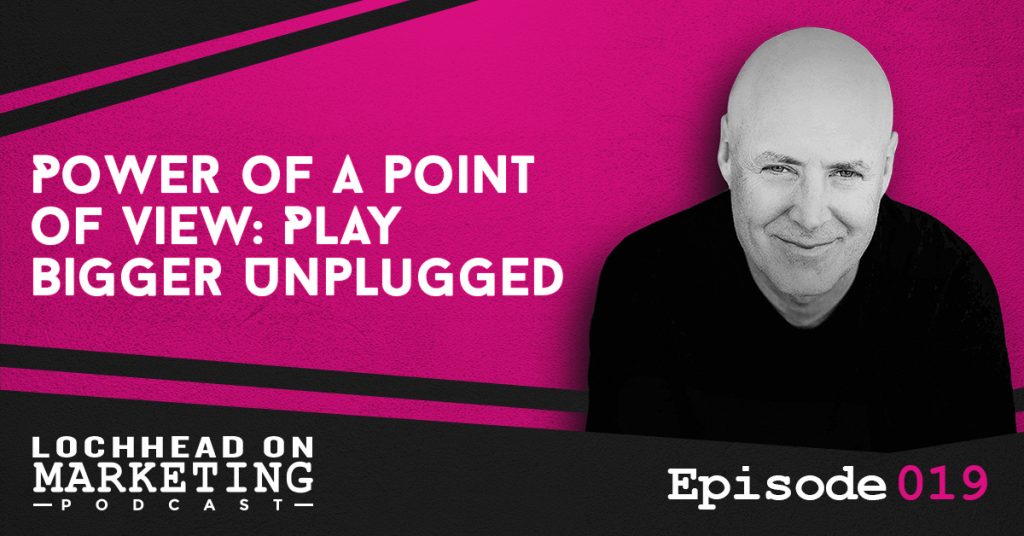
Podcast (lochheadonmarketing): Play in new window | Download (Duration: 15:27 — 14.2MB) | Embed
Subscribe: Apple Podcasts | Spotify | RSS | More
Christopher Lochhead shares an excerpt today from his first book, Play Bigger: How Pirates, Dreamers, and Innovators Create and Dominate Markets about the importance and the power of a point of view. He shares to us why legendary marketers opt to sell a POV, rather than sell a product or service.
Market the POV, not the product!
Legendary creators and designers, market the point of view or POV, not their product and services. When companies show consumers the idea or the problem that they envision to solve, consumers will most likely become interested in the products and services around that idea.
“Its counter-intuitive for most marketers, innovators and CEOs. We think what we’re doing in marketing, is marketing a product with features and maybe, benefits. When in reality, category creators and designers market the POV, because once people subscribe to your way of looking at things, they are going to be interested in what you have to market.” – Christopher Lochhead
POVs are timeless
POV is the company’s true North. It doesn’t change over time, unlike messaging. Companies such as Salesforce or American Airlines have consistently focused on their POV. These are companies who have anchored their business to a point of view, about what they stand for in the world.
Messaging is Tailored POV for an Audience
Christopher cites examples on how messages are tailored POVs for an audience, idea or a trend. He shares how they train an entire company on how to deliver their POV. Employees watch a 10-min presentation on thePOV of the company. The ultimate goal is for the employees to be able to deliver the POV.
Play Bigger Chapter 5
Here is an excerpt from Chapter 5 of the book Play Bigger:
“Stories have always been an industrial-strength force in human progress, from the epic poems of Homer to the tales of Marco Polo, Shakespeare’s historical plays, the novels of Ayn Rand, and biographies of Steve Jobs.
Stories alter perspectives and exert influence.
When traders on Wall Street consider a stock, they often ask, “What’s the story?”
When pitching a venture capitalist, entrepreneurs get funding when they craft a great story, and now a cottage industry offers pitch training.
Raw information reaches us on an intellectual level, but stories reach into our hearts and our pants.
Decades of brain research have demonstrated that stories have a more lasting impact than facts.
One 1969 Stanford study, “Narrative Stories as Mediators for Serial Learning,” showed that students remembered six to seven times more words embedded in a story compared to random words. [i]
In the 2010s, Paul Zak, a professor at Claremont Graduate University found that character-driven, attention-grabbing stories actually increase oxytocin in the brain.
Oxytocin is an empathy chemical, and it motivates cooperation and understanding—quite important when trying to convince someone to, as Apple used to say, think different.
“My experiments show that character-driven stories with emotional content result in a better understanding of the key points a speaker wishes to make and enable better recall of these points weeks later,” Zack wrote.
He added a swipe at the way too much business has been conducted for far too long:
“In terms of making an impact, [storytelling] blows the standard PowerPoint presentation to bits.”[ii]
That’s why category designers tell a story. We call that story a point of view, or POV.
After you come up with an aha of an initial market or technology insight, and after you discover and define the right category, you have to craft the story about the category that you’ll tell. You need a powerful POV.
A POV tells the world you’re a company on a mission, not a missionary company looking to make money any way it can.
It frames the new problem that your category identifies and sets you up as the answer. When someone can articulate your problem, you believe that person must have the solution.
It’s why Bill Clinton won two presidential elections by claiming, “I feel your pain,” and why Ronald Reagan beat Jimmy Carter by simply asking, “Are you better off than you were four years ago?”
Politicians are masters at this.
A great POV separates the companies, products, and categories that people love from the ones they, at best, tolerate.
When you start to think about it, you can easily see the difference between a company that has a strong POV and one that has a POV black hole.
In grocery stores, you can sense that Whole Foods has a clear POV, built around healthy gourmet products, while Safeway seems to have no POV at all other than selling groceries.
Southwest Airlines has a palpable POV; United Airlines does not.
Apple has a POV; Microsoft does not.[iii]
A POV conditions the market to accept and embrace the company’s vision and have the same aha the founders experienced.
The story leads potential customers on their from/to journey, so they understand both what is missing and why your company can fix that problem.
A POV has to shift people’s minds so they reject an old way of thinking and come to believe in something new.
It has to reach people on an emotional level.
No one remembers what you say—but they remember how you made them feel.
That feeling can be excitement about something that’s coming, or fear of missing out.
Some of the best POVs make people think: “Oh fuck, I don’t have one of those! I have to get one of those!”
To reach people’s emotions, a POV has to sound the way people talk.
It has to be simple, direct, visceral. Language matters! (check out episode Don’t Take My Word For It, inspired by Lee Hartley Carter)
Nobody in the history of the human race has ever been moved to joy or tears by a train wreck of lazy business babble.
The story about your business is more important than the facts about your business.
Sound outrageous? Maybe, but the brain research proves it’s true.
People relate to and remember stories—even people who make a living analyzing facts.
A POV tells a story with a beginning, middle, and end.
It tells the world why this category and the company creating it are different.
Different sticks.
Different forces a choice between what was and what can be.
A POV built around better is about comparing your offering to the thing customers already know.
Better reinforces the power of the category king you’re trying to beat (who by definition is not you).
If customers think two companies are tied in the better wars, they just choose the category king—or the lowest price if there’s no clear king.
A great POV takes you outside the better wars and sets you in a different space all your own.
A well-executed POV gives the company identity and culture.
It becomes the invisible hand that guides your priorities.
It results in the right kinds of employees joining the company, the right kinds of investors funding it, and the right ecosystem building out around it—and, by the way, repels those you don’t want hanging around.
Ultimately, the POV steers the company’s strategy.
A powerful POV guides every decision the leadership team makes and every initiative it pursues.
The POV helps employees intuitively feel how they should perform their jobs so they align with the company’s strategy.
Most great, enduring companies have a POV imprinted on their DNA.
To hear more about the power of a point of view and more relevant information from Christopher Lochhead, download and listen to the episode.
Bio:
Christopher Lochhead is a Top 25 podcaster and #1 Amazon bestselling co-author of books: Niche Down and Play Bigger.
He has been an advisor to over 50 venture-backed startups; a former three-time Silicon Valley public company CMO and an entrepreneur.
Furthermore, he has been called “one of the best minds in marketing” by The Marketing Journal, a “Human Exclamation Point” by Fast Company, a “quasar” by NBA legend Bill Walton and “off-putting to some” by The Economist.
In addition, he served as a chief marketing officer of software juggernaut Mercury Interactive. Hewlett-Packard acquired the company in 2006, for $4.5 billion.
He also co-founded the marketing consulting firm LOCHHEAD; was the founding CMO of Internet consulting firm Scient, and served as head of marketing at the CRM software firm Vantive.
Links:
Follow Your Different – Lee Hartley Carter
Lochhead on Marketing: Don’t Take My Word For It
Play Bigger: How Pirates, Dreamers, and Innovators Create and Dominate Markets
[ii] Paul J. Zack, “Why Your Brain Loves Good Storytelling,” Harvard Business Review, October 28, 2014,
[iii] At least it does not in the 2000s. In the 1980s and 1990s, under Bill Gates, Microsoft certainly had a POV. Roughly translated, it was: “A computer on every desk, all of them running Windows, and we’ll bulldoze the fuck out of anyone who gets in our way.” In the 2010s, under a new CEO, Microsoft is again trying to find its voice.
We hope you enjoyed this episode of Lochhead on Marketing™! Christopher loves hearing from his listeners. Feel free to email him, connect on Facebook, Twitter, Instagram and subscribe on iTunes! You may also subscribe to his newsletter, The Difference, for some amazing content.
107 How FanDuel Became a Category King & The Future of Podcasting w/ Nigel Eccles
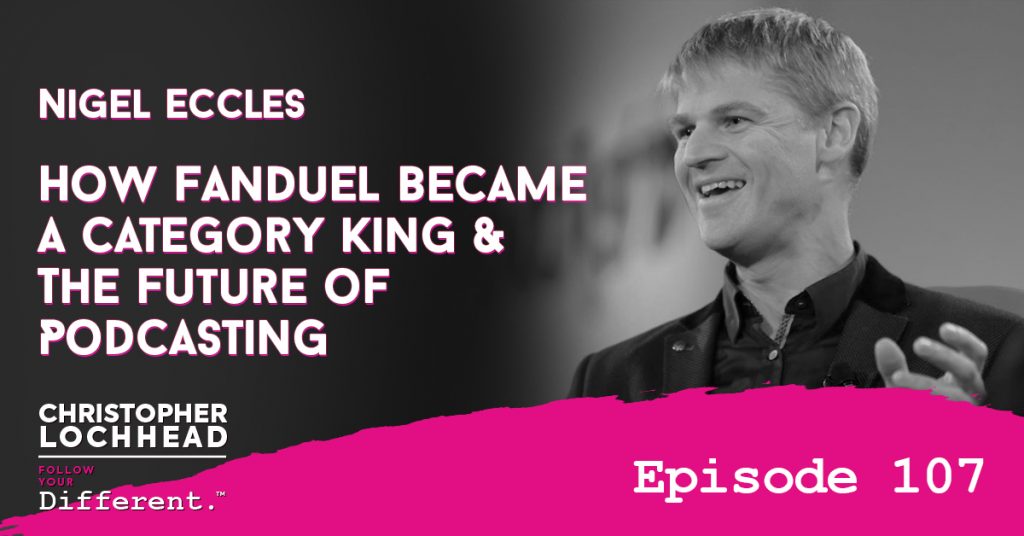
Podcast: Play in new window | Download (Duration: 1:31:48 — 84.3MB) | Embed
Subscribe: Apple Podcasts | Spotify | Pandora | RSS | More
Our guest is the legendary entrepreneur Nigel Eccles. He’s the founder of Fan Duel, the category king in Daily fantasy sports. We go deep on how Fan Duel created and ultimately dominated this mega category.
We also talk about how they created a super-engaged community and how they explored podcast advertising to promote the brand. Nigel explains why he thinks podcasting is a massive new opportunity. In fact, it is one of his motivations why he started his new company, Flick.
FanDuel Fantasy Sports
Forbes reports that daily Fantasy Games is growing at 41% annually, and will be $14.4 billion category in 2020. This brought together five lads from Edinburg Scotland to join this trend. They created FanDuel back in 2009 as they wanted to create a simple platform for fantasy sports enthusiasts.
“We wanted to build something that is so simple and even we can play and I think actually is a big part of the success of the company.” – Nigel Eccles
Building Communities
Nigel narrated how they started FanDuel 10 years ago. When they started FanDuel, Fantasy Sports was played by 25 million people in North America. Their main motivation was creating a sort of community with the same interests — a platform that would connect individuals, not only with friends but with tens of thousands of people.
“It started to connect people who were players. It started to build a community. People want to do it more and more because they want to show they were the best in the community.” – Nigel Eccles
Nigel shares his tips for entrepreneurs when building a community. He advises to first, think about the direct connection you can have with customers and what mechanism can you use to establish that connection. Secondly, entrepreneurs must think about how these customers can connect with each other.
Podcast Advertising
As FanDuel was starting, Nigel and the other founders realized the user base is not growing. Their CMO planned to execute several advertising campaigns, mostly focusing on radio and podcasting. With a great product and innovative advertising, the business grew largely.
“The great thing about FanDuel is, anybody who listens to sports radio was a sports fan.” – Nigel Eccles
Nigel and his team tried a lot of different formats on radio and podcast advertising. They had endorsements and games, where listeners get to compete with the hosts. Christopher shared a lot of information about podcasting and how huge the opportunity is for advertising.
“Podcasting is an enormous opportunity. It is hugely unmonetized. It is one of the best advertising mediums today because there’s a connection with the host. It’s such a strong endorsement. The best hosts only sell what they believe in.” – Nigel Eccles
To hear more about how FanDuel became a Category King and the future of podcasting, and more relevant information about Nigel, download and listen to the episode.
Bio:
Nigel has vast startup experience and was previously the co-founder and CEO of FanDuel, one of Scotland’s first unicorn companies.
Links:
We hope you enjoyed this episode of Follow Your Different™! Christopher loves hearing from his listeners. Feel free to email him, connect on Facebook, Twitter, Instagram and subscribe on iTunes! Get amazing, different stories on business, marketing, and life. Subscribe to our newsletter The Difference.
018 Personal Branding is Bullshit
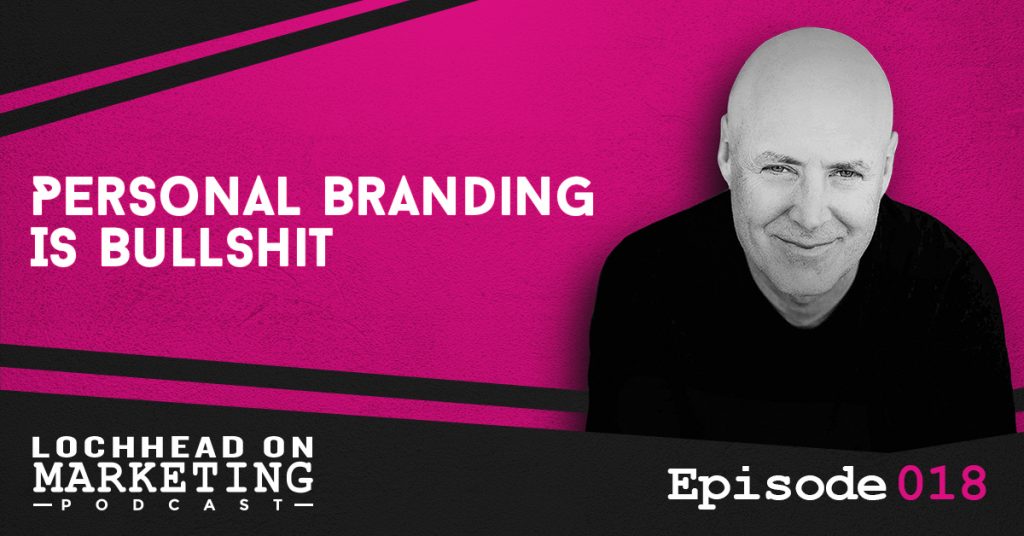
Podcast (lochheadonmarketing): Play in new window | Download (Duration: 10:03 — 9.3MB) | Embed
Subscribe: Apple Podcasts | Spotify | RSS | More
In this episode, Christopher Lochhead talks about a giant topic in business today, personal branding. He further shares the difference between a brand and a person. Moreover, he discusses why legendary executives and marketers don’t give weigh to personal branding much.
Personal Beef with Personal Branding
Personal branding has become a giant issue in business today. It seems like people cannot fire up their social media, such as Linkedin and even Amazon, without personal branding. The idea started around the late 80s or early 90s and has become effed up overtime.
Christopher lays out his argument on the difference between a brand and a person. People have a mental connection with a brand while with a person, people develop relationships.
“I have a very different relationship with my friend Sue Barsamian. She’s the most effective exec I know. Guess how much time she spent thinking about and working on her personal brand? Zero!” – Christopher Lochhead
Developing A Reputation
Sue Barsamian was the guest on Follow Your Different Episode 083. She has a solid 36-years in Silicon Valley, working with Startups and multinationals such as HP. Christopher shares that she has zero efforts in maintaining a personal brand, instead, she aims to develop a reputation.
Silicon Valley respects Sue for producing legendary results and creating massive value. Moreover, she dominated her own niche: “Legendary Enterprise Tech Executive, who scales.” In developing a reputation, Christopher poses the following questions:
“What’s your personal Niche Down? Where are you going to focus your talent? What results are you going to produce? Who are the kinds of people you want to surround yourself with?” – Christopher Lochhead
Rethink this Personal Branding Bullshit
Christopher encourages everyone to re-think this idea of personal branding because he believes that what people prefer is a reputation.
“Reputations come from producing legendary results. Personal branding, by definition, is contrived and inauthentic.” – Christopher Lochhead
People would best be deemed as a person of character, who produces results and is doing legendary work. In conclusion, Christopher advises everyone to spend zero time on personal branding and focus, instead, on the following:
1) Your personal Niche Down – what niche do you want to be known for owning
2) Producing legendary results – people who produce legendary results are highly sought after in business. They are unique by definition and they hang out with people who also do legendary things.
3) and making a difference.
“Because in my experience, people who do that, get the most valuable thing in business: a reputation.” -Christopher Lochhead
To hear more about why personal branding is bullshit and more relevant information from Christopher Lochhead, download and listen to the episode.
Bio:
Christopher Lochhead is a Top 25 podcaster and #1 Amazon bestselling co-author of books: Niche Down and Play Bigger.
He has been an advisor to over 50 venture-backed startups; a former three-time Silicon Valley public company CMO and an entrepreneur.
Furthermore, he has been called “one of the best minds in marketing” by The Marketing Journal, a “Human Exclamation Point” by Fast Company, a “quasar” by NBA legend Bill Walton and “off-putting to some” by The Economist.
In addition, he served as a chief marketing officer of software juggernaut Mercury Interactive. Hewlett-Packard acquired the company in 2006, for $4.5 billion.
He also co-founded the marketing consulting firm LOCHHEAD; was the founding CMO of Internet consulting firm Scient, and served as head of marketing at the CRM software firm Vantive.
Links:
Follow Your Different Episode 083: Sue Barsamian
We hope you enjoyed this episode of Lochhead on Marketing™! Christopher loves hearing from his listeners. Feel free to email him, connect on Facebook, Twitter, Instagram and subscribe on iTunes! Get amazing, different stories on business, marketing, and life. Subscribe to our newsletter The Difference.
106 Silicon Valley Legend Randy Komisar
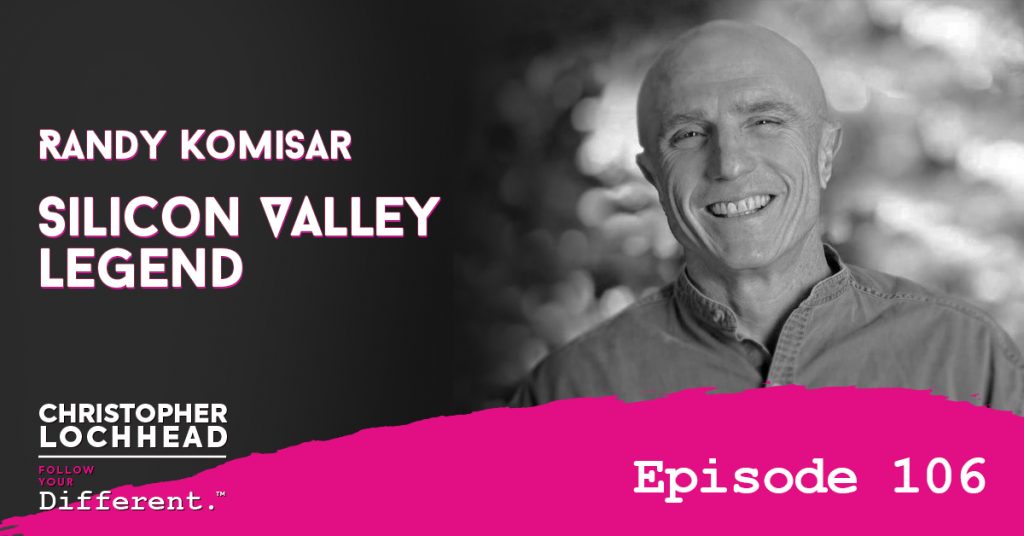
Podcast: Play in new window | Download (Duration: 1:46:38 — 97.9MB) | Embed
Subscribe: Apple Podcasts | Spotify | Pandora | RSS | More
Silicon Valley legend, Randy Komisar joins us today in a longer than usual episode, but definitely an information-packed conversation. He shares a piece of his mind to us especially on how to have a legendary career, what it’s like to be dubbed as the Digital CEO and many more.
Rare Opportunity
Randy Komisar was a partner at VC pioneer Kleiner Perkins Caufield & Byers. He worked closely with other legends like Steve Jobs and George Lucas. In fact, he has some very interesting stories he shared, being a former senior counsel at Apple and former CEO at LucasArts.
“I don’t like being disliked and I don’t particularly try to be liked. I try to be valued, to create something constructive or positive in a relationship. But being liked is not, it doesn’t cross my mind. I want to be respected, if I’m really lucky, I’d like to be admired.” – Randy Komisar
The Virtual CEO
Silicon Valley CEOs dubbed him as a Virtual CEO. Randy served in that role for companies like WebTV and Global Giving. He had some compelling stories and opinions to share in what Christopher dubbed as “the business equivalent of the lunar landing.”
He also served as the founding director of TiVo, which is a direct lineage of Netflix entering that category today. Tivo won one of the biggest patent damage claims of all time, way over billion dollars, and Randy recounts to Christopher what happened during that time.
“I actually think, we should have sued earlier. we have the patent rights to all of these, the real question was, could we have coop these guys as partners.” – Randy Komisar
Utopians Vs. Libertarians
Two significant and different technology demographics comprise Silicon Valley.
He describes the 70’s and 80’s guys as the technology Utopians. Infrastructures were allegedly oppressive at that time which led the Utopians to utilize tools and come to technology to end this. Ultimately, they wanted to empower individuals.
Furthermore, the Utopians had a sense of ‘a social contract.’ They felt they need to make the world better. These tools and the advantages that they had with these tools gave them the opportunity to challenge the status quo.
In the advent of Facebook and Paypal, we move from technology utopians to technology libertarians.
“The tools and platform that you build raise the creative endeavor. It’s not to take-the-money- and-run situation. That money gets invested in more ideas, more vision. Yes you need to make a profit, but that profit can fuel creativity or consumption, you get to choose.” – Randy Komisar
To hear more about the Silicon Valley Legend Randy Komisar, download and listen to the episode.
Bio:
Randy Komisar joined Kleiner Perkins in 2005 and focuses on early-stage investing.
He served as CFO of GO Corp. and as senior counsel for Apple Computer, following a private practice in technology law.
Randy is a founding director of TiVo and serves on the Roadtrip Nation Advisory Board and Orrick’s Women’s Leadership Board.
Additionally, he is the author of the best-selling book The Monk and the Riddle, as well as several articles on leadership and entrepreneurship.
Furthermore, he is the co-author of Straight Talk for Startups, the insider best practices for entrepreneurial success, Getting to Plan B, on managing innovation, and I F**king Love that Company, on building consumer brands.
Randy frequently speaks in the United States and abroad on such topics. Randy holds a B.A. degree in economics from Brown University and a J.D. from Harvard Law School.
Links:
Book: Straight Talk for Startups
The Monk and the Riddle: The Art of Creating a Life While Making a Living
Executives Launch Podcast To Pass On Lessons From Bill Campbell, Coach To Silicon Valley Stars
Harper Collins Speakers Bureau: Randy Komisar
We hope you enjoyed this episode of Follow Your Different™! Christopher loves hearing from his listeners. Feel free to email him, connect on Facebook, Twitter, Instagram and subscribe on iTunes!
017 Frame the Problem and Win
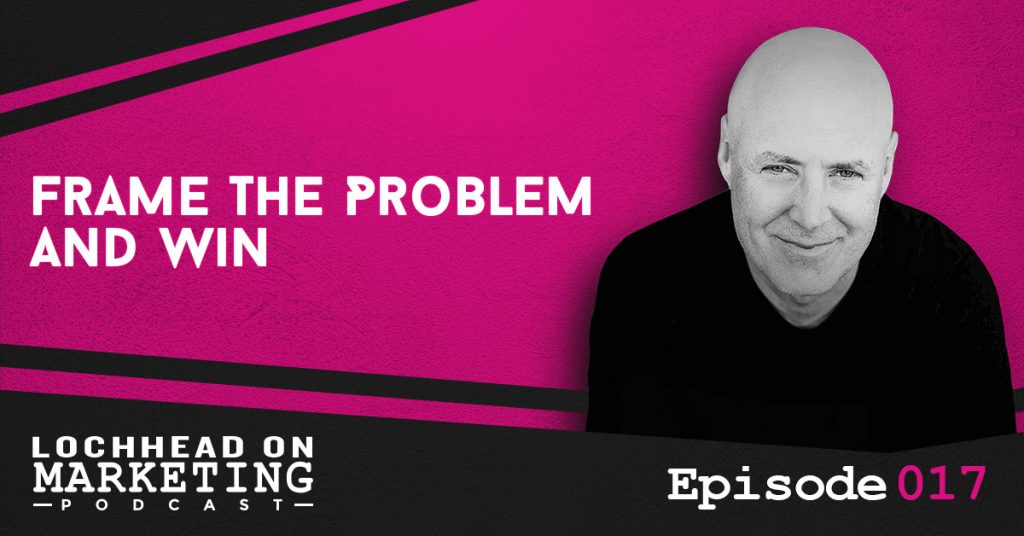
Podcast (lochheadonmarketing): Play in new window | Download (Duration: 10:52 — 10.0MB) | Embed
Subscribe: Apple Podcasts | Spotify | RSS | More
In this episode, Christopher Lochhead talks about why the company that frames and markets the problem, the most effectively, wins. To illustrate, he cites a music company, m, and ho they recently pulled something off in the marketing and PR point of view.
Frame the Problem, Not the Solution
Wise marketers and category creators have a strategic way of creating legendary marketing. One of these is framing the problem. This strategy is a sure-fire way to win a category.
“When the world agrees with you about the problem that you solved, and thinks about the problem, exactly the way you want them to, then they sort of have an ‘a-ha!’” – Christopher Lochhead.
Case In Point: Kobalt
One illustration of this point is a recent article about Kobalt. Kobalt is a music technology company, which recently raised $200 million in VC funding.
TechCrunch featured Kobalt in a two-part series. Christopher highlights a part of the article stating “changing the way the music industry does business and putting more money into musicians’ pockets in the process.”
What blew Christopher’s mind off is the title of the article: “How Kobalt is simplifying the killer complexities of the music industry.”
Why is this headline, mind-blowing?
Christopher believes that Kobalt’s PR team presented their company in a very effective way since TechCrunch featured them. The reporter Eric Peckam, needs to believe that there are “killer complexities” in the music business and that these need to be “simplified.”
“They [Kobalt] are evangelizing their problem and in this case, their getting the media to write a headline at the top of the homepage, with the exact framing of the problem that they want.” – Christopher Lochhead
As Christopher describes it, this is a legendary category design PR. Once people think that you get their problem, they connect the dots and infer that you have the solution.
“If you want to be moving your company forward, evangelize the problem. Spend a lot more time marketing, talking about the problem than the solution.” – Christopher Lochhead
To hear more about how to Frame the Problem and Win and more relevant information from Christopher Lochhead, download and listen to the episode.
Bio:
Christopher Lochhead is a Top 25 podcaster and #1 Amazon bestselling co-author of books: Niche Down and Play Bigger.
He has been an advisor to over 50 venture-backed startups; a former three-time Silicon Valley public company CMO and an entrepreneur.
Furthermore, he has been called “one of the best minds in marketing” by The Marketing Journal, a “Human Exclamation Point” by Fast Company, a “quasar” by NBA legend Bill Walton and “off-putting to some” by The Economist.
In addition, he served as a chief marketing officer of software juggernaut Mercury Interactive. Hewlett-Packard acquired the company in 2006, for $4.5 billion.
He also co-founded the marketing consulting firm LOCHHEAD; was the founding CMO of Internet consulting firm Scient, and served as head of marketing at the CRM software firm Vantive.
Links:
TechCrunch: How Kobalt is simplifying the killer complexities of the music industry
We hope you enjoyed this episode of Lochhead on Marketing™! Christopher loves hearing from his listeners. Feel free to email him, connect on Facebook, Twitter, Instagram and subscribe on iTunes!
105 The Freak Factor w/ David Rendall
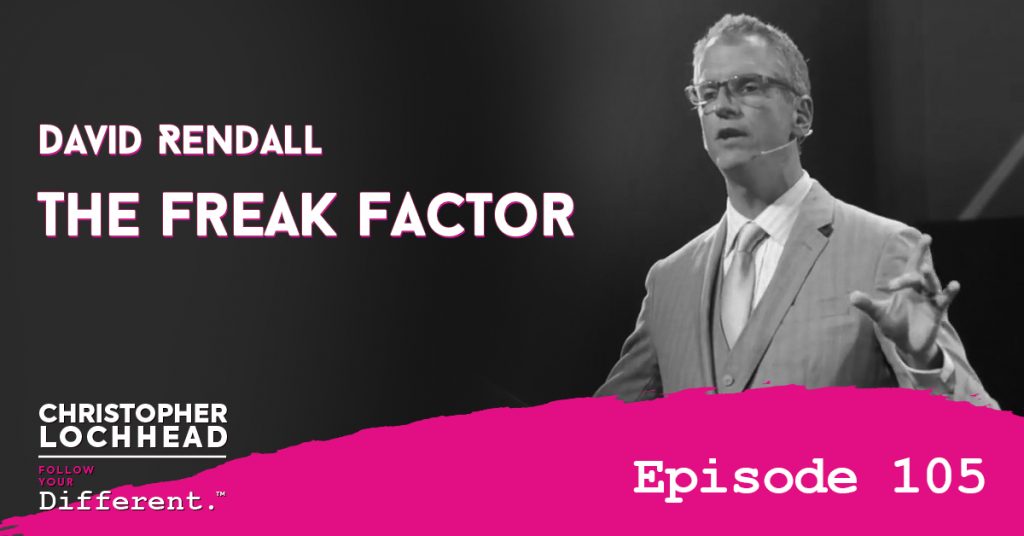
Podcast: Play in new window | Download (Duration: 1:22:41 — 76.0MB) | Embed
Subscribe: Apple Podcasts | Spotify | Pandora | RSS | More
Today’s guest is David Rendall—a standup comedian, with a doctorate in organizational leadership and author of The Freak Factor—gives us a run-down on self-acceptance which benefits our personal and business life. He talks about how our weaknesses can become strengths and why finding people who are weird like you is a good thing.
The Good and the Bad
Twiggy. Stickman. Ladder. These are some of the nicknames of David Rendall during his younger years. He was unusually skinny when he was young and was working odd jobs, something that most people of his age would not even bother to try. However, David turned his life around and embraced his inner freak.
The word freak usually has dual meanings. If people dub someone as a control freak or a neat freak, it usually means they are overdoing it and they need to tone it down. On the other hand, being called a freak in a sporting context means you have outside of ordinary skills.
“Freak is often a term we use for criticism but its also a term we use positively. I want both of those associations. I want it to remind people of something negative and positive at the same time.” – David Rendall
Embracing The Freak in You
David encourages people to be different in a very specific way. People should be willing to be themselves and to disregard the idea that they need to hide their weaknesses. Most of the time, people suppress who they are because of the pressures from their parents, teachers, employers, friends, and society.
“I’m trying to get people to see themselves differently and finding their strength in spite of that weakness and be willing to amplify and embrace those parts of themselves.” – David Rendall
Oftentimes, David says that people sacrifice uniqueness for acceptance. In his book, he discusses the importance of affiliation. He defines it as finding other people who are a freak in their own ways.
“Partner with people who are strong where you are weak. Look for the people who are different from you, but the other side of that is, finding the right spot and finding the right people.” – David Rendall
Be Weird and Different.
As he encourages people to find others who are also weird, he reminds people to not expect acceptance, love, and connection from everyone. He advises people not to force themselves everywhere, instead, to find people who will accept them as they are.
“You’re not gonna win everybody over. Ultimately it’s about finding people like youfor the weird person that you are, instead of ‘they’ll like you once you’ve changed.’” – David Rendall
He also shares the reason why people get stuck hiding who they are: because they thought people around them know better than them. These people—parents, teachers, employers—are often bound by rules of success and they thought imposing these will also ensure success.
To hear more about The Freak Factor, and more information about David, download and listen to the episode.
Bio:
David Rendall. Randall. Randell. Rendell. Reynolds. Whatever.
No one knows how to pronounce his last name.
David’s mission in life is to be hilarious and helpful.
He’s a standup comedian with a doctorate in management.
A class clown turned leadership professor, he went from disrupting classes to teaching classes to disrupting companies and conferences from Portland to Paris to Pakistan.
After being criticized and punished his whole life for being hyperactive, he now channels his frantic energy to compete in Ironman triathlons and ultramarathons.
He wears more pink than the average middle-aged man. Well, actually, he wears more pink than an eight-year-old princess.
As a nonprofit executive, he built businesses to employ people with disabilities.
During the last fifteen years, David Rendall has spoken to audiences on every inhabited continent.
His clients include the US Air Force, Australian Government, and Fortune 50 companies such as Microsoft, AT&T, United Health Group, Fannie Mae, and State Farm.
In addition to his doctorate in organizational leadership, David has a graduate degree in psychology.
He is the author of four books: The Four Factors of Effective Leadership, The Freak Factor, The Freak Factor for Kids and
• Pink Goldfish
Links:
Freak Factor: Discovering Uniqueness by Flaunting Weakness
We hope you enjoyed this episode of Follow Your Different™! Christopher loves hearing from his listeners. Feel free to email him, connect on Facebook, Twitter, Instagram and subscribe on iTunes!
016 Category Creation Courage
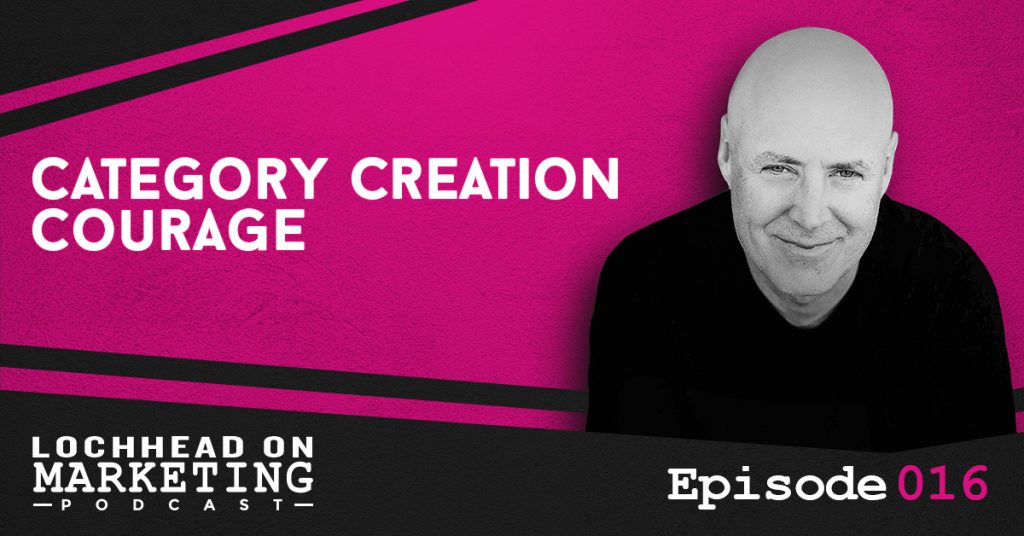
Podcast (lochheadonmarketing): Play in new window | Download (Duration: 8:20 — 7.7MB) | Embed
Subscribe: Apple Podcasts | Spotify | RSS | More
In today’s episode, Christopher Lochhead talks about why courage is a critical ingredient for legendary marketing and category design. He poses the question: “What does it take to make legendary marketing happen?” and he shares some except his book Niche Down to answer this.
Break From The Pack
What does it take to break from the pack? The pack, which usually means the general public, the people who think and does the same kind of marketing. What do we need to enable us to design a category and from then, execute to dominate that category?
On Christopher’s second book, Niche Down, co-writer Heather Clancy wrote some very important pointers in creating a category
“I hope you find it informative and inspiring as it relates to summoning the courage to actually do something legendary, design and dominate a category.” – Christopher Lochhead
Excerpts from Niche Down
Heather Clancy wrote in the book:
Category design actually requires going against that pack mentality. Humans have a primordial need to feel safe in numbers. We get a lot of positive feedback from being the same as others. Our challenge to you is to break from the pack. Free the creative part, the innovative part,the legendary part of you — and let that part be different.
Our dream is that you harness the exponential power of what makes you different versus the incrementalism of just being better. Because it is being different that makes a difference. And we know how tough that can be.
“Kermit The Frog” famously sang: “It’s not easy being green.”
Bill Walton, the NBA legend commiserates: “In life, things go wrong. In life, things collapse….People try to drag you down and people try to say ‘No’ to you.”
He goes on to posit, “I want to live in a world of ‘Yes’.” Of course, there will be a lot of “losery” along the way. To be legendary is to be ready for setbacks, disappointments and failures.
Because shit happens. Sometimes, life can be crushing. We’ve both been crushed more times than we can count. It’s okay to be a loser.
We all are. Failure is our teacher. Failure is our friend. Failure is our coach. Failure gives us humility. Failure gives us grit. Failure gives us a foundation. Losing is an essential ingredient for being legendary. Every time we lose we have a choice.
Give up.
Or, take the loss head on, learn from it and execute like a badass legend.
It Takes Courage to be Legendary
What Heather and Christopher are trying to communicate is the “emotional or psychological” barrier in doing legendary marketing. To put it simply, it takes a lot of courage to be legendary. Courage is moving forward in pursuing your plans, even though a lot of evidence states it won’t work.
Christopher cited his other podcast, Follow Your Different as an example. Regardless of what the experts in the podcasting industry were telling him — that business people will not listen to a long-form, unedited conversation podcast — FYD has become a top 200 overall charting podcast in the United States.
“If you believe in the problem you’re solving and you believe in your vision, then go with it. Be different, stick to it and have the courage to be legendary and execute like a badass legend.” – Christopher Lochhead
To hear more about Category Creation Courage and more relevant information from Christopher Lochhead, download and listen to the episode.
Bio:
Christopher Lochhead is a Top 25 podcaster and #1 Amazon bestselling co-author of books: Niche Down and Play Bigger.
He has been an advisor to over 50 venture-backed startups; a former three-time Silicon Valley public company CMO and an entrepreneur.
Furthermore, he has been called “one of the best minds in marketing” by The Marketing Journal, a “Human Exclamation Point” by Fast Company, a “quasar” by NBA legend Bill Walton and “off-putting to some” by The Economist.
In addition, he served as a chief marketing officer of software juggernaut Mercury Interactive. Hewlett-Packard acquired the company in 2006, for $4.5 billion.
He also co-founded the marketing consulting firm LOCHHEAD; was the founding CMO of Internet consulting firm Scient, and served as head of marketing at the CRM software firm Vantive.
Links:
Niche Down: Become Legendary Different
We hope you enjoyed this episode of Lochhead on Marketing™! Christopher loves hearing from his listeners. Feel free to email him, connect on Facebook, Twitter, Instagram and subscribe on iTunes!
104 Enterprise Tech Category Queen Jennifer Tejada

Podcast: Play in new window | Download (Duration: 1:07:00 — 61.5MB) | Embed
Subscribe: Apple Podcasts | Spotify | Pandora | RSS | More
Our guest for today is the CEO of the newly public, enterprise technology company PagerDuty, none other than Jennifer Tejada.
This episode is the second part of the two-part series on IPO. Jennifer shares with us today how it is like to go public. This is a celebration of entrepreneurship and you’ll have fun listening to this long-free-form conversation.
Legendary IPO
Jennifer had a legendary career in Silicon Valley. Various media outlets featured Jennifer due to the recent IPO of PagerDuty, a leading platform for real-time operations.
In a moment of victory, what Christopher calls as “a celebration of entrepreneurship,” Jennifer recounts to Christopher the joys and pains on transitioning from being private to becoming public.
“I enjoyed the process of being forced to refine our story and our value proposition for retail investors and laypeople. I think its really helpful for the business to go through that exercise.” – Jennifer Tejada
NYSE Feels
Jennifer shares that there was not much significant change in terms of their monthly operations. In fact, she perceives the preparation to go public as running two-jobs and she and her CFO vowed to make the most out of it.
“It’s very hard to describe the intrinsic rewards of looking down from the podium of NYSE at a group of people and just seeing this, sort of wonderment in their faces. They just can’t believe, little old us got here, and that is one of the most rewarding moments of my career.” Jennifer Tejada
Jennifer also professed her admiration with her employees who went through this significant milestone with her.
“I don’t think there’s enough of said or honor pay to the folks that bet their careers early on and take pay cuts and take on option risks, to see a company through multiple investment cycle and growth cycles and ups and downs.” – Jennifer Tejada
Extending Reach
Jennifer describes IPO as a big-day-coming-out-party-to-the-world. Further, she mentions that one of the reasons PagerDuty went public is to extend its reach, to tap an enormous market opportunity. She believes being under the radar does not serve that big mission.
“We serve the enterprise market and these enterprises are members of NYSE. They are traded in the NASDAQ. They expect the level of transparency around our performance and how our capitals are being spent and the long term viability of our businesses.” – Jennifer Tejada
Likewise, going public can help create brand awareness and credibility because the company has to go through a lot of processes that will serve public market investors.
“In my view, that rigor, and extra scrutiny is good for business. Hiding away in the private market just for the sake of staying away from that scrutiny is not a good thing because you can’t survive with poor habits for a long period of time.” – Jennifer Tejada
To hear more about the Enterprise Tech Category Queen Jennifer Tejada, download and listen to the episode.
Bio:
Jennifer Tejada is the CEO and Chairperson of PagerDuty (NYSE: PD), a leading platform for real-time operations.
She is a veteran software industry executive and business leader with over 25 years of experience, spanning mass consumer products to disruptive cloud and software solutions.
Jennifer has a successful track record in product innovation, optimizing operations and scaling public and private enterprise technology companies.
PagerDuty went through a strong IPO in April 2019 through her leadership.
Prior to her role at PagerDuty, Jennifer was the CEO of Keynote Systems where she led the company to strong profitable growth before its acquisition by Dynatrace in 2015.
Before Keynote, Jennifer was Executive Vice President and Chief Strategy Officer at the enterprise software company Mincom leading its global strategy up to its acquisition in late 2011 by ABB.
She has also held senior positions at Procter & Gamble and i2 Technologies (acquired by JDA Software).
Jennifer currently serves as a board member of The Estée Lauder Companies Inc. (NYSE: EL) and Puppet, Inc.
Jennifer holds a B.S. from the University of Michigan.
Links:
PagerDuty analysts shower stock with love even after doubling in a month
PagerDuty stock skyrockets nearly 60% on first trading day after IPO
We hope you enjoyed this episode of Follow Your Different™! Christopher loves hearing from his listeners. Feel free to email him, connect on Facebook, Twitter, Instagram and subscribe on iTunes!
015 Product-Market Fit Is A Dangerous Idea
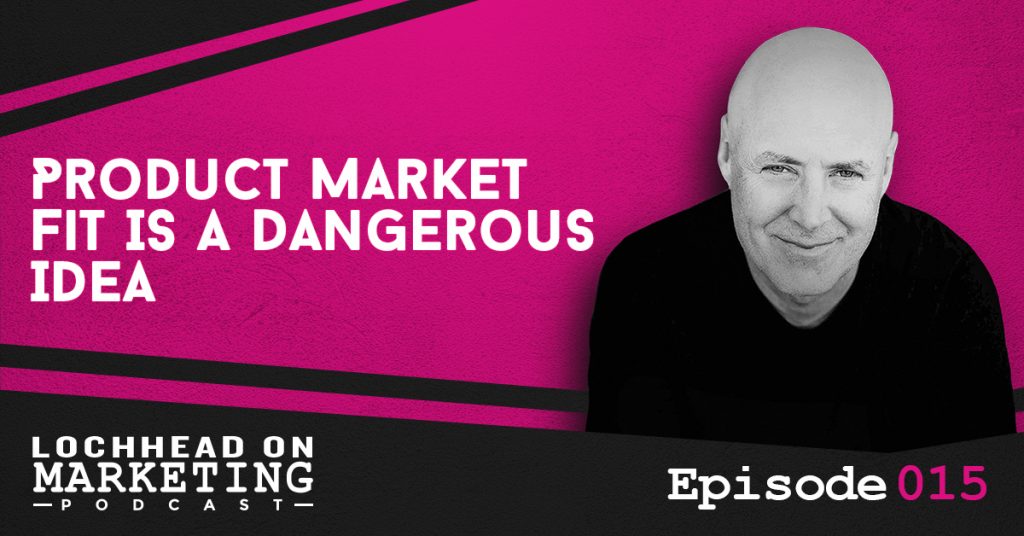
Podcast (lochheadonmarketing): Play in new window | Download (Duration: 12:51 — 20.7MB) | Embed
Subscribe: Apple Podcasts | Spotify | RSS | More
In most industries, product-market fit is an unquestioned gospel, even in Silicon Valley. On the contrary, Christopher believes that product-market fit is a dangerous idea. Why? Because legendary marketers create and design their own category, as opposed to competing in an existing category.
Product-Market Fit
In the tech startup world, achieving product-market fit is often considered a major milestone. However, Christopher argues that product-market fit is one of the most dangerous ideas in business today.
“The problem with product-market fit is that language can trick marketers into thinking that what you’re doing is building a product and you’re trying to fit it in a market.” – Christopher Lochhead
Legendary creators are not looking to “fit” into a market, instead, they want to stand out. Standing out means to design their own market category.
Category King and Queens
Christopher cites some of the category kings and queens of today. Think about Jeff Bezos, he is equated with the term eCommerce, just as we equate Pablo Picasso with Cubism. We also have Sara Blakely of Spanx, who created her own category of Shapeware, not just trying to fit into the girdle category.
“Think about the most respected entrepreneurs, creators, and innovators. a huge part of why we all respect them is because they broke or took new ground.” – Christopher Lochhead
Some other great examples are AirBNB, which presented a new idea and experience for tourists and travelers. Another one is Evian, who deviated from the idea that water is free. Red Bull also dominated their energy drink category, as opposed to hydration drinks, where Gatorade was category king.
“The greatest innovators teach the world to think differently. With a fresh idea, a new take on an old problem or by solving a problem we didn’t even know we had.” – Christopher Lochhead
Where the Challenge Lies
The challenge of product-market fit is, it can trap inventors and creators into thinking that they can test their product and service to people and f they consume it, they equate it to the future success of the product. If these people do not consume the product intuitively, then they can just go back and work on the product.
This is in opposition to Henry Ford’s mindset who said: “If I had asked people what they wanted, they would have said faster horses.” Moreover, even Steve Jobs has the same ideas on product-market fit, saying “customers don’t know what they want until we’ve shown them.”
“The big ah-ha here is that there is a massive distinction between fitting into an existing market category and competing versus creating your own new market category.” – Christopher Lochhead
To hear more about why Product-Market Fit Is A Dangerous Idea and more relevant information from Christopher Lochhead, download and listen to the episode.
Bio:
Christopher Lochhead is a Top 25 podcaster and #1 Amazon bestselling co-author of books: Niche Down and Play Bigger.
He has been an advisor to over 50 venture-backed startups; a former three-time Silicon Valley public company CMO and an entrepreneur.
Furthermore, he has been called “one of the best minds in marketing” by The Marketing Journal, a “Human Exclamation Point” by Fast Company, a “quasar” by NBA legend Bill Walton and “off-putting to some” by The Economist.
In addition, he served as a chief marketing officer of software juggernaut Mercury Interactive. Hewlett-Packard acquired the company in 2006, for $4.5 billion.
He also co-founded the marketing consulting firm LOCHHEAD; was the founding CMO of Internet consulting firm Scient, and served as head of marketing at the CRM software firm Vantive.
Links:
Quora: How do you define Product-Market Fit?
We hope you enjoyed this episode of Lochhead on Marketing™! Christopher loves hearing from his listeners. Feel free to email him, connect on Facebook, Twitter, Instagram and subscribe on iTunes!

